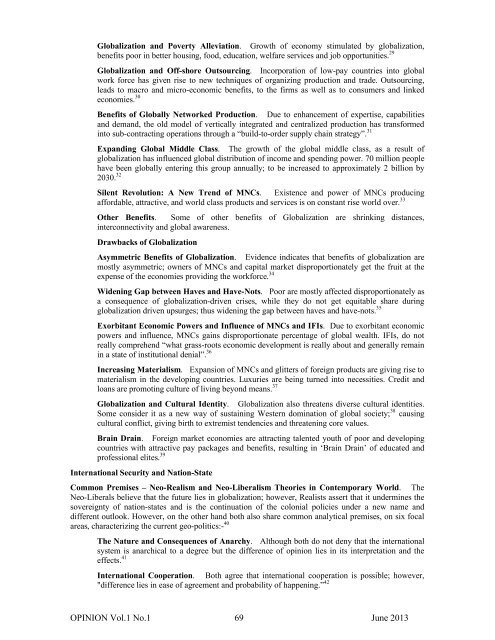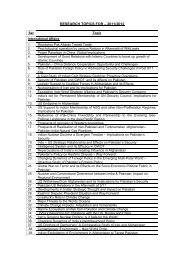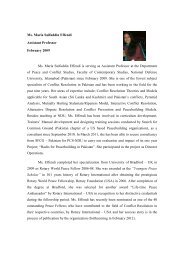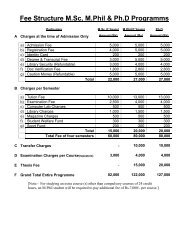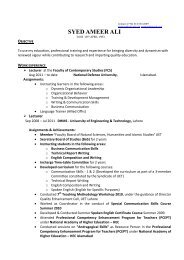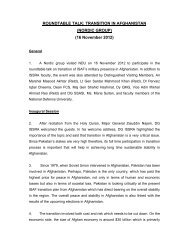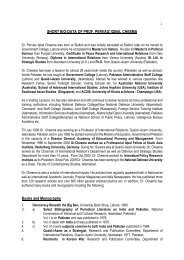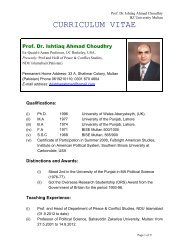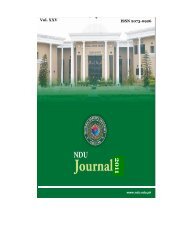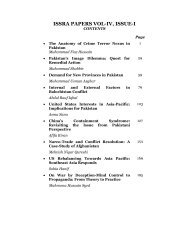OPINION Vol.1, No.1 June 2013 - National Defence University
OPINION Vol.1, No.1 June 2013 - National Defence University
OPINION Vol.1, No.1 June 2013 - National Defence University
You also want an ePaper? Increase the reach of your titles
YUMPU automatically turns print PDFs into web optimized ePapers that Google loves.
Globalization and Poverty Alleviation. Growth of economy stimulated by globalization,<br />
benefits poor in better housing, food, education, welfare services and job opportunities. 29<br />
Globalization and Off-shore Outsourcing. Incorporation of low-pay countries into global<br />
work force has given rise to new techniques of organizing production and trade. Outsourcing,<br />
leads to macro and micro-economic benefits, to the firms as well as to consumers and linked<br />
economies. 30<br />
Benefits of Globally Networked Production. Due to enhancement of expertise, capabilities<br />
and demand, the old model of vertically integrated and centralized production has transformed<br />
into sub-contracting operations through a “build-to-order supply chain strategy”. 31<br />
Expanding Global Middle Class. The growth of the global middle class, as a result of<br />
globalization has influenced global distribution of income and spending power. 70 million people<br />
have been globally entering this group annually; to be increased to approximately 2 billion by<br />
2030. 32<br />
Silent Revolution: A New Trend of MNCs. Existence and power of MNCs producing<br />
affordable, attractive, and world class products and services is on constant rise world over. 33<br />
Other Benefits. Some of other benefits of Globalization are shrinking distances,<br />
interconnectivity and global awareness.<br />
Drawbacks of Globalization<br />
Asymmetric Benefits of Globalization. Evidence indicates that benefits of globalization are<br />
mostly asymmetric; owners of MNCs and capital market disproportionately get the fruit at the<br />
expense of the economies providing the workforce. 34<br />
Widening Gap between Haves and Have-Nots. Poor are mostly affected disproportionately as<br />
a consequence of globalization-driven crises, while they do not get equitable share during<br />
globalization driven upsurges; thus widening the gap between haves and have-nots. 35<br />
Exorbitant Economic Powers and Influence of MNCs and IFIs. Due to exorbitant economic<br />
powers and influence, MNCs gains disproportionate percentage of global wealth. IFIs, do not<br />
really comprehend “what grass-roots economic development is really about and generally remain<br />
in a state of institutional denial”. 36<br />
Increasing Materialism. Expansion of MNCs and glitters of foreign products are giving rise to<br />
materialism in the developing countries. Luxuries are being turned into necessities. Credit and<br />
loans are promoting culture of living beyond means. 37<br />
Globalization and Cultural Identity. Globalization also threatens diverse cultural identities.<br />
Some consider it as a new way of sustaining Western domination of global society; 38 causing<br />
cultural conflict, giving birth to extremist tendencies and threatening core values.<br />
Brain Drain. Foreign market economies are attracting talented youth of poor and developing<br />
countries with attractive pay packages and benefits, resulting in ‘Brain Drain’ of educated and<br />
professional elites. 39<br />
International Security and Nation-State<br />
Common Premises – Neo-Realism and Neo-Liberalism Theories in Contemporary World. The<br />
Neo-Liberals believe that the future lies in globalization; however, Realists assert that it undermines the<br />
sovereignty of nation-states and is the continuation of the colonial policies under a new name and<br />
different outlook. However, on the other hand both also share common analytical premises, on six focal<br />
areas, characterizing the current geo-politics:- 40<br />
The Nature and Consequences of Anarchy. Although both do not deny that the international<br />
system is anarchical to a degree but the difference of opinion lies in its interpretation and the<br />
effects. 41<br />
International Cooperation. Both agree that international cooperation is possible; however,<br />
"difference lies in ease of agreement and probability of happening.” 42<br />
<strong>OPINION</strong> <strong>Vol.1</strong> <strong>No.1</strong> 69 <strong>June</strong> <strong>2013</strong>


